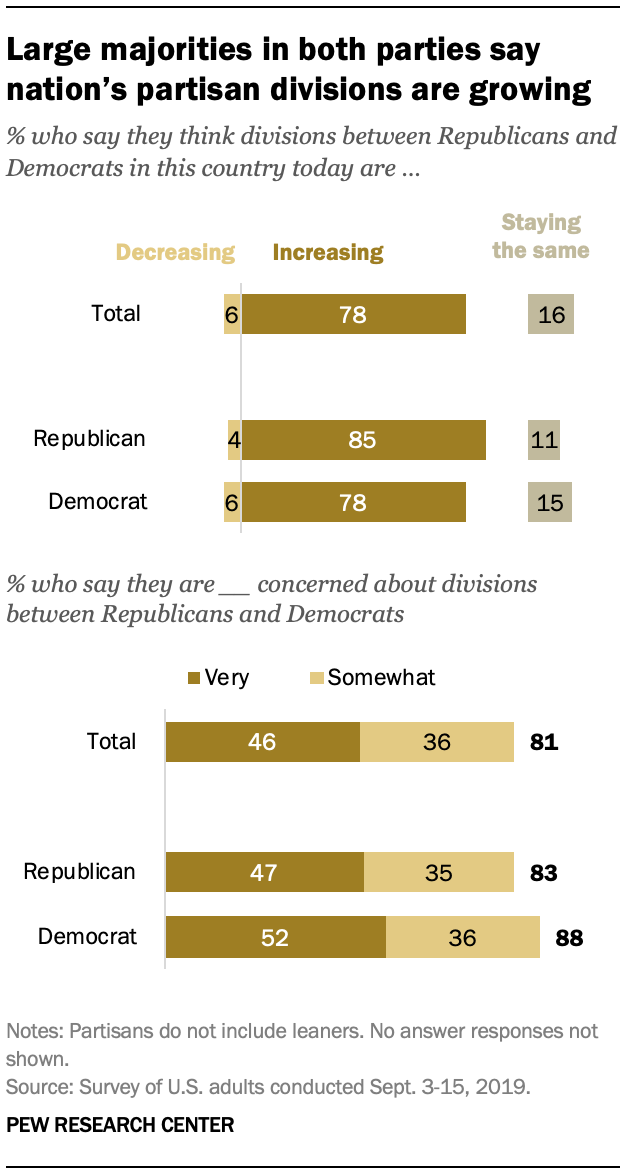
Republicans and Democrats agree on very little in the current political environment, but there is a widespread belief in both parties that partisan divisions in the country are increasing. Among the public overall, 78% say divisions between Republicans and Democrats in this country are increasing, while just 6% say they are decreasing and 16% say they are staying the same.
Large majorities in both parties say partisan divisions are increasing, though Republicans are somewhat more likely than Democrats to express this view (85% vs. 78%).
Similarly, large majorities in both parties express concern about rising partisanship. About eight-in-ten adults (81%) say they are very or somewhat concerned about divisions between Republicans and Democrats, including nearly half (46%) who say they are very concerned about the growing divide.
Comparable shares of Republicans and Democrats express concern about divisions between the two parties, though Democrats are slightly more likely to say this than Republicans (88% vs. 83%).
A similar pattern is evident among independents who lean toward a party. About three-quarters of independents who lean toward the Republican Party (77%) or Democratic Party (74%) say partisan divisions are growing. Comparable shares of those who lean toward each party express concern about this.
Growing share of Americans say there are major differences in what the parties stand for
A majority of Americans (55%) say there is a “great deal” of difference in what the Republican and Democratic parties stand for, while 37% see a “fair amount” of difference and 7% say there is “hardly any” difference between the two parties.
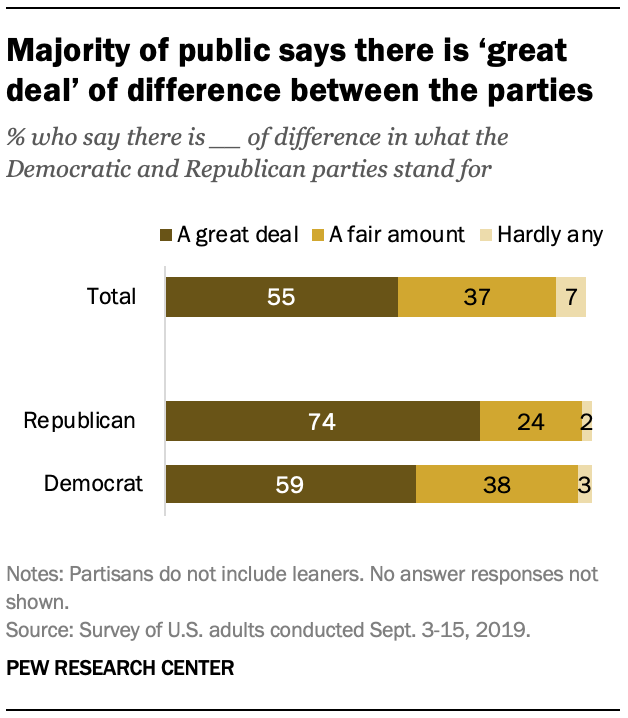
These opinions have changed dramatically over the past three decades. From the late 1980s through the mid-2000s, no more than about a third of Americans said there were major differences between the two parties. But the share expressing this view has increased, especially over the past decade.1
In the current survey, Republicans are more likely than Democrats to say there are major differences in what the parties stand for (74% of Republicans vs. 59% of Democrats).
In both parties, people who are attentive to politics on a regular basis are more likely than those who are less attentive to see wide, growing divides in the country.
Most Republicans who say they follow what is happening in government and public affairs most of the time perceive a great deal of difference in what the Democratic and Republican parties stand for (85%). Among Republicans who follow government and public affairs less often, a smaller majority (65%) says there are major differences between the parties. Among Democrats, there is a similar gap in views by engagement; 70% of politically attentive Democrats see a wide gulf between the parties, while just 49% of less-attentive Democrats say the same.
Most Americans say partisan disagreements extend beyond policies to ‘basic facts’
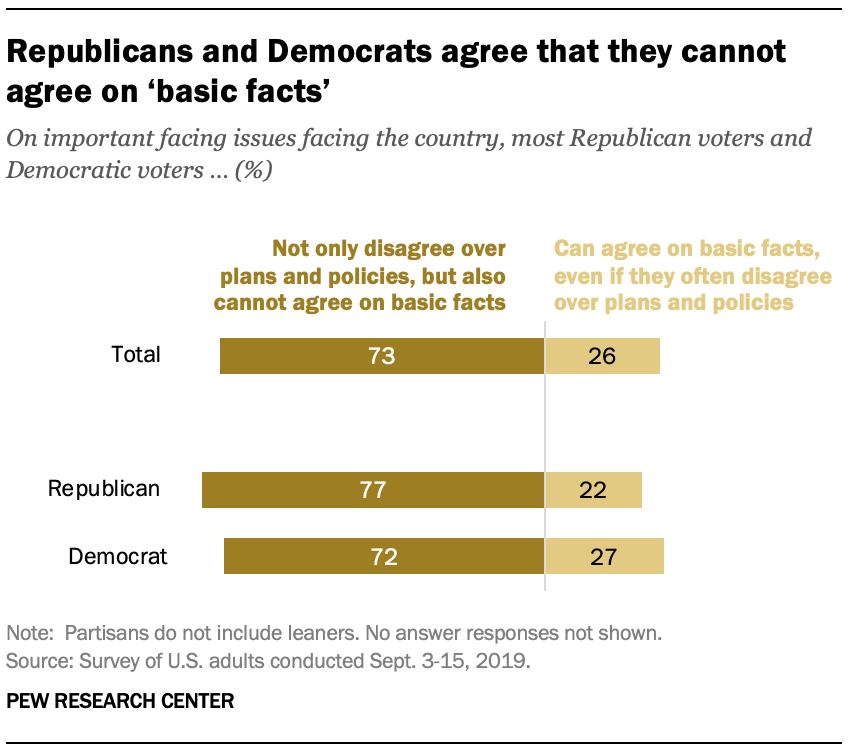
Fully 73% of the public says that most Republican and Democratic voters not only disagree over plans and policies, but also disagree on “basic facts.” Just 26% say that while partisan voters often differ over plans and policies, they can agree on basic facts. These opinions have changed only modestly since last year.
Comparable majorities of Republicans (77%) and Democrats (72%) say that Republican and Democratic voters cannot agree on basic facts.
Does the other party have any good ideas?
Most Republicans and Democrats believe that few – or no – good ideas come from the other party. Only 17% of Republicans say that the Democratic Party has “a lot” or “some” good ideas” and only 13% of Democrats say this about the Republican Party. In fact, nearly half in both parties say the other has almost no good ideas.
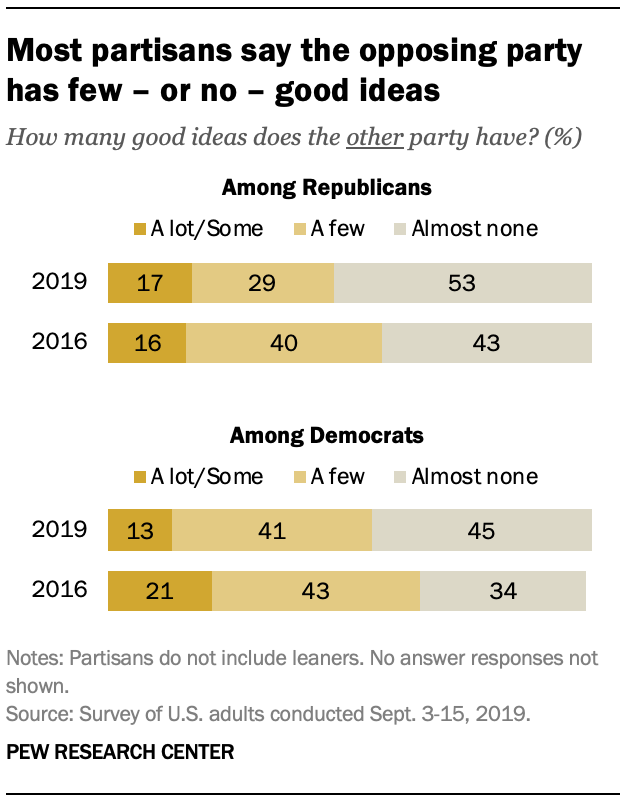
Overall, 45% of Democrats say the GOP has almost no good ideas, while 41% say it has a few and just 13% say it has a lot or some good ideas. The share of Democrats saying the Republican Party has almost no good ideas is higher than it was in the spring of 2016 (45% now, 34% then), while the share saying the GOP has at least some good ideas has dropped from 21% to 13%.
Among Republicans, 53% say the Democratic Party has almost no good ideas, while another 29% say they have a few; just 17% of Republicans say the Democratic Party has a lot or some good ideas. The share of Republicans who say the Democratic Party has almost no good ideas has increased since 2016 (from 43% to 53%).
Republicans and Democrats have different views about compromising with the other party
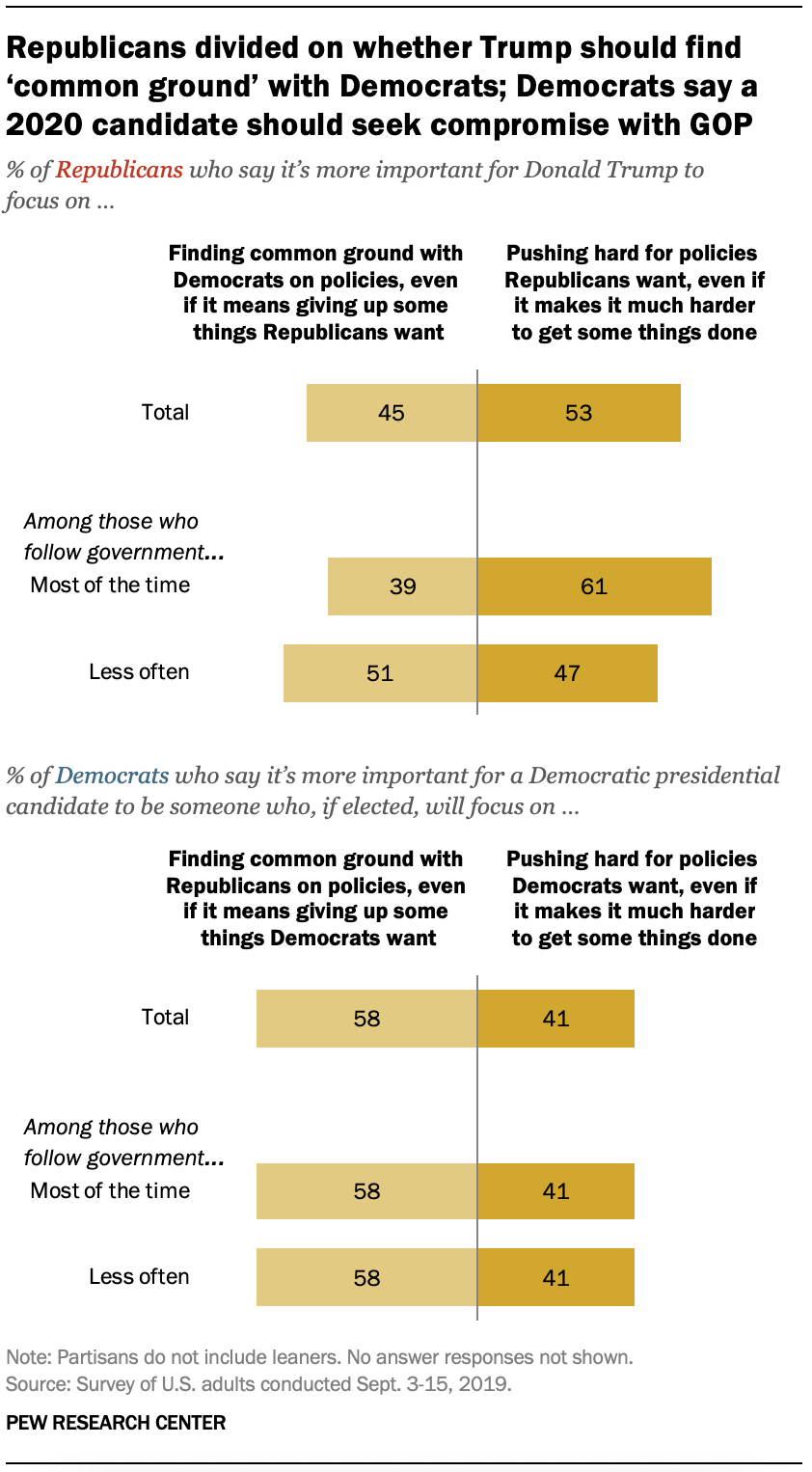
Overall, Republicans are divided over whether Donald Trump should focus on finding common ground with Democrats, even if that means giving up some things Republicans want, or pushing hard for GOP policies, even if it means less gets done. While 53% of Republicans say Trump should “push hard” for the party’s policies, 45% say it’s more important for the president to find common ground with Democrats.
However, politically attentive Republicans broadly oppose Trump seeking compromise with Democrats even if it means giving up some things Republicans want. Just 39% of Republicans who follow government and public affairs most of the time say it is more important for Trump to find common ground with Democrats; 61% say he should push hard for GOP policies. Opinion is more evenly divided among less politically attentive Republicans.
Democrats, who were asked a hypothetical version of the question about the party’s 2020 presidential candidates, are more open to potential compromise with Republicans. About six-in-ten Democrats (58%) say it is more important for a candidate, if elected, to find common ground with Republicans even if it means giving up things Democrats want.
There are no differences in these views among Democrats based on political attentiveness. But liberal Democrats (54%) are less likely than conservative and moderate Democrats (62%) to say it is more important for a candidate to seek compromises with Republicans.
There is an even sharper ideological divide among Republicans in views of whether Trump should make compromises. Just 39% of conservative Republicans say Trump should find common ground with Democrats if it means giving up things Republicans want; about two-thirds of GOP moderates and liberals (63%) say the same.
Views of the parties’ traits and characteristics
The Republican Party and the Democratic Party are both seen as too extreme by a majority of Americans. About six-in-ten (63%) say the phrase “too extreme in its positions” describes the Republican Party at least somewhat well, including 30% who say this describes the GOP very well. The share of Americans who say the same phrase applies to the Democratic Party is nearly identical: 61% say this applies at least somewhat, and 29% say it describes the party very well.
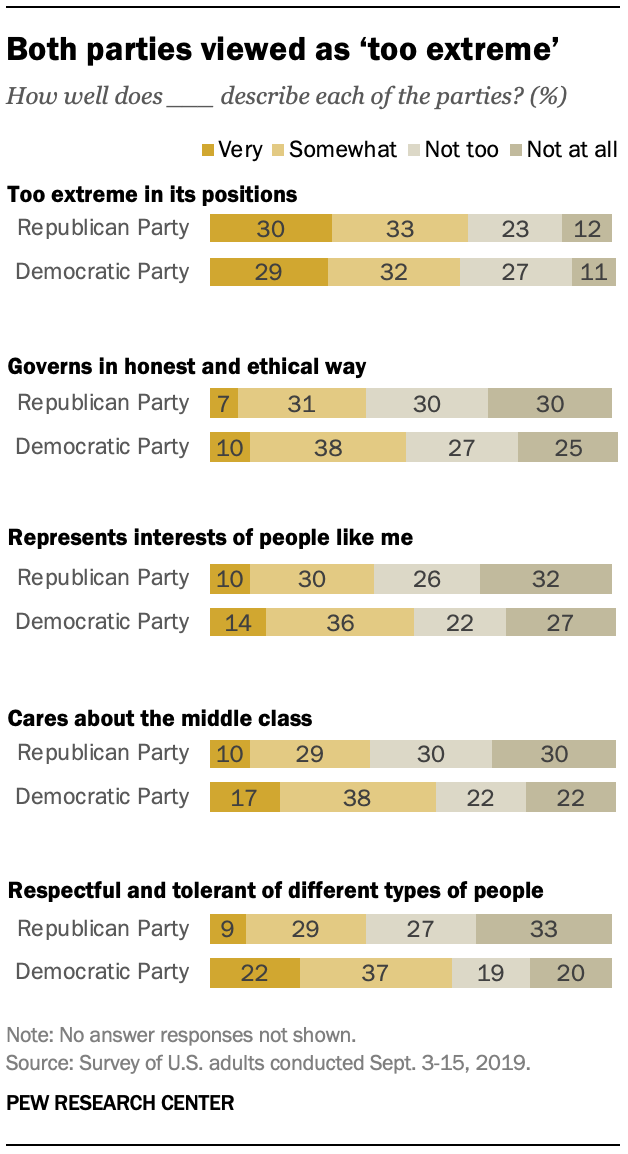
The public also is critical of the parties ability to govern honestly and ethically: Just 38% say the phrase “governs in an honest and ethical way” describes the Republican Party at least somewhat well, while 61% say it does not. Roughly half (47%) say this describes the Democratic Party at least somewhat well, while about as many (52%) say it doesn’t.
The public views the Democratic Party more positively than the Republican Party on three other traits and characteristics. Four-in-ten (40%) say that the phrase “represents the interests of people like me” applies at least somewhat well to the Republican Party, while half (50%) say this phrase describes the Democratic Party at least somewhat well.
A majority (55%) says the description “cares about the middle class” describes the Democratic Party at least somewhat well. By comparison, 39% say that it applies to the Republican Party.
The widest gap in opinion across the items included in the survey is over whether the two parties are “respectful and tolerant of different types of people.” Six-in-ten (60%) say this phrase describes the Democratic Party at least somewhat well; 38% say it describes the Republican Party somewhat or very well.
Large majorities of Republicans and Democrats assign positive characteristics to their own party, while taking a much more negative view of the opposing party.
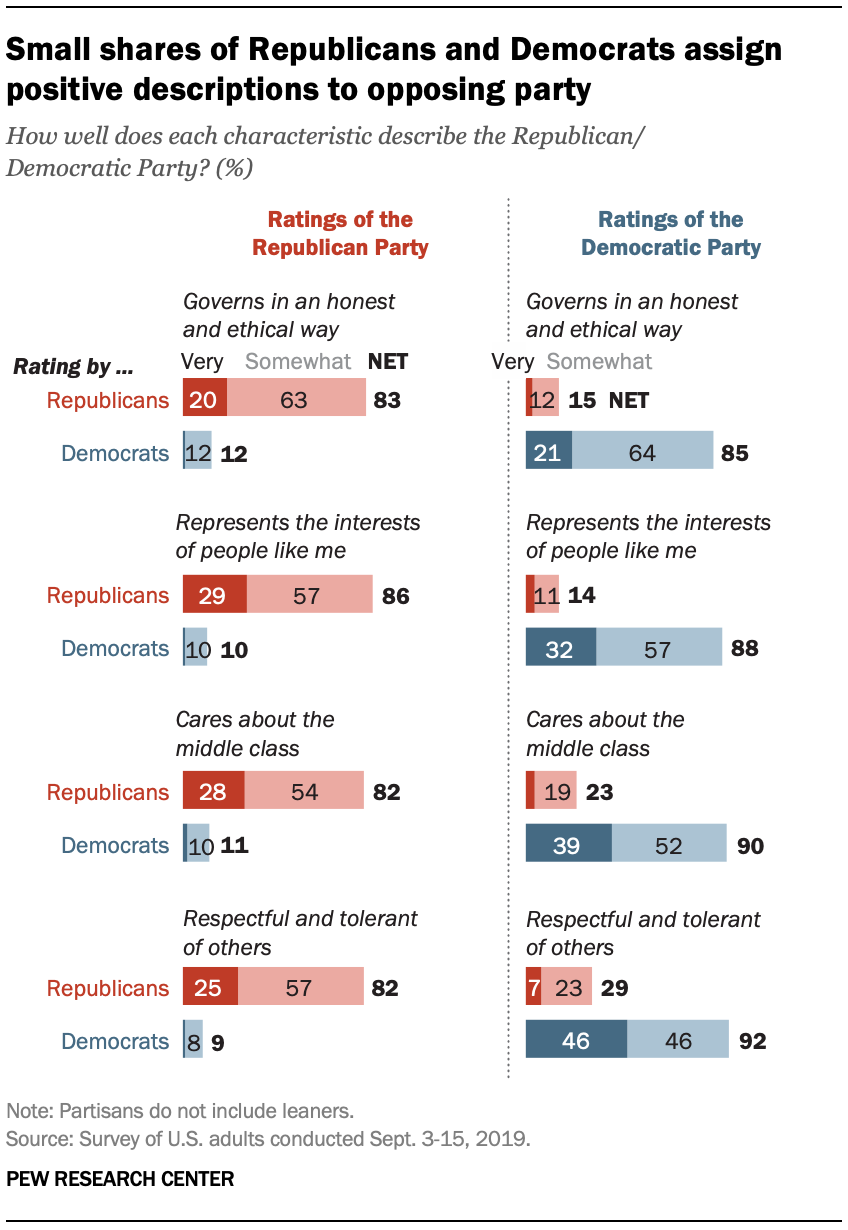
For instance, 83% of Republicans say the phrase “governs in an honest and ethical way” describes the GOP very or somewhat well; just 12% say this phrase describes the Democratic Party well. The pattern of opinion is very similar among Democrats: 85% of Democrats describe their own party as governing in an honest and ethical way, while just 15% say this describes the Republican Party.
However, a greater share of Democrats (90%) than Republicans (82%) say their own party cares about the middle class. In addition, the share of Republicans who say the Democratic Party cares about the middle class (23%) is larger than the share of Democrats who describe the GOP this way (11%).
There is a similar pattern on views of how respectful and tolerant the parties are of different types of people. A larger majority of Democrats (92%) than Republicans (82%) describe their own party this way. And out-party assessments – while low among both sets of partisans – are more positive among Republicans than Democrats.
Republicans and Democrats are more willing to critique their own party over the extremity of its positions. Overall, 47% of Democrats and 45% of Republicans say their own party is described very or somewhat well by the phrase “too extreme in its positions.”
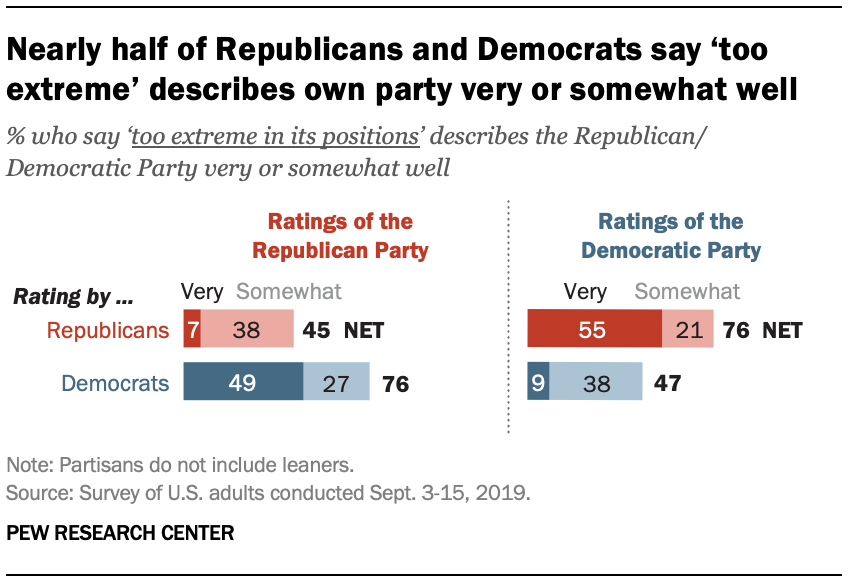
Still, partisans are much more likely to cast this criticism toward the opposing party than their own: Majorities of Republicans and Democrats (both 76%) describe the opposing party as too extreme in its positions.
On this measure, there is little difference between partisan leaners and identifiers. Similar majorities of those who identify with a party and those who lean toward a party view the other side as too extreme in its positions.
Across the positive traits included in the survey – such as governing in an honest and ethical way – smaller majorities of partisan leaners than identifiers take a positive view of the party they associate with.